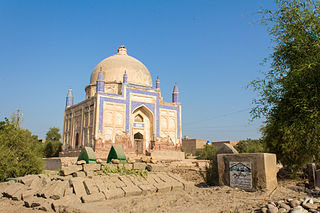
Larkana is a city located in the Sindh province of Pakistan. It is the 15th largest city of Pakistan by population. It is home to the Indus Valley civilization site Mohenjo-daro. The historic Indus River flows in east and south of the city.

Christianity is the third-largest religion in Pakistan, with results from the 2023 Census recording over three million Christians, or 1.37% of the total population in Pakistan. The province of Punjab has the largest population of Christians in the country. The majority of Pakistan's Christians are members of the Catholic Church or the Church of Pakistan, with the remainder belonging to other Protestant groups.

Larkana District is a district of the Sindh province of Pakistan. Its largest city is Larkana, which sits on the banks of the Indus River. It is the home district of the influential Bhutto family.

The Catholic Church in Pakistan is part of the worldwide Catholic Church, under the spiritual leadership of the pope in Rome.
Larkana is the fourth largest city in Sindh Province, Pakistan. It is located in Larkana District and is a thickly populated city which is growing rapidly. In August 2000, Larkana celebrated its hundredth year of existence.

The Archdiocese of Karachi is a Latin Church ecclesiastical territory or archdiocese of the Catholic Church in Pakistan. It was erected on 20 May 1948 under as a then-suffragan diocese in the ecclesiastical province of the metropolitan Archdiocese of Bombay.

The Roman Catholic Diocese of Hyderabad is a diocese of the Latin Church of the Roman Catholic Church in Pakistan.
The Board of Intermediate and Secondary Education, Larkana is an educational board located in Larkana, Sindh, Pakistan.
On 22 September 2013, a twin suicide bombing took place at All Saints Church in Peshawar, Pakistan, in which 127 people were killed and more than 250 injured. It was the deadliest attack on the Christian minority in the history of Pakistan.
Bhurgari Railway Station is located in Village Ghulam Nabi Bhurgri, Taluka Shahdadkot, District Qamber Shahdadkot District, Sind, Pakistan.
Larkana Junction Railway Station is a railway station located in Larkana, Sindh, Pakistan. It was built in 1891. The station is staffed and has a booking office.

PS-12 Larkana-III is a constituency of the Provincial Assembly of Sindh.

PS-11 Larkana-II is a constituency of the Provincial Assembly of Sindh.

On 15 March 2015, two explosions took place at Roman Catholic Church and Christ Church during Sunday service in Youhanabad, Lahore, Pakistan. At least 15 people were killed and seventy were wounded in the attacks.
The Larkana–Jacobabad Light Railway was one of several branch lines in Pakistan, operated and maintained by Pakistan Railways. The line began at Larkana Junction and ended at Jacobabad Junction. The total length of this railway line is 136 kilometers (85 mi) with 14 railway stations.
The Bahawalpur church shooting was a mass shooting at Saint Dominic's Church in Bahawalpur, Punjab, Pakistan on 28 October 2001 by six assailants belonging to Lashkar-e-Jhangvi. The guard of the church and 17 other Christians were killed.

The 2017 Quetta church attack took place on 17 December 2017 when armed militants and suicide bombers stormed the Bethel Memorial Methodist Church in the western Pakistani city of Quetta, killing nine people and injuring dozens more. The attack was perpetrated by the Islamic State, who claimed responsibility through its Amaq media outlet.

NA-194 Larkana-I is a National Assembly of Pakistan. It mainly comprises the Ratodero Taluka and some areas of the Larkana Taluka, which includes a portion of the city of Larkana. It was created in the 2018 delimitation after the constituency overlapping between Qambar Shahdadkot District and Larkana District was ended.

NA-195 Larkana-II is a newly created constituency for the National Assembly of Pakistan. It mainly comprises the Dokri Taluka, Bakrani Taluka, and some areas of the Larkana Taluka, which includes a portion of the city of Larkana. It was created in the 2018 delimitation after the constituency overlapping between Qambar Shahdadkot District and Larkana District was ended.














